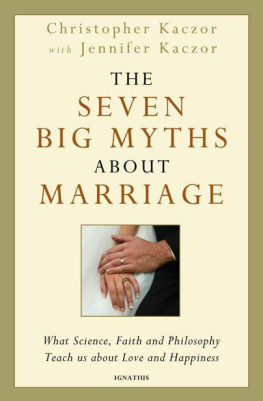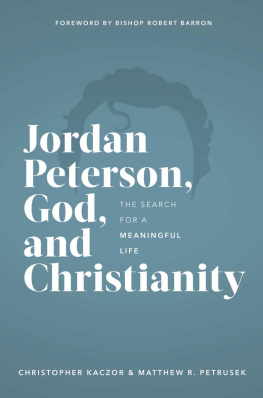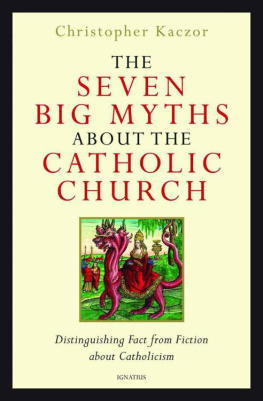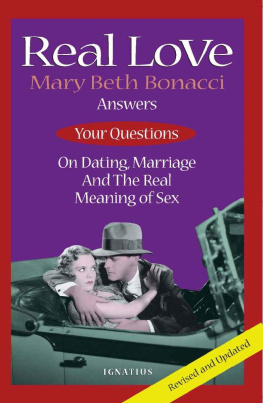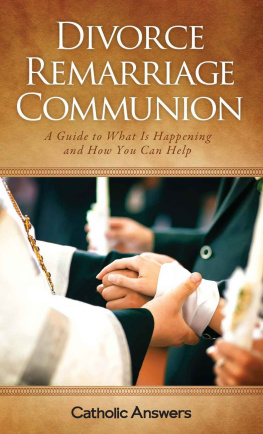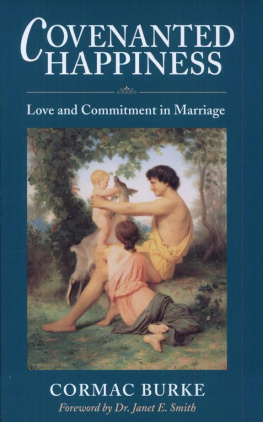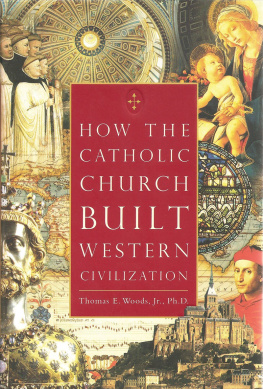THE SEVEN BIG MYTHS
ABOUT
MARRIAGE
THE SEVEN BIG MYTHS
ABOUT
MARRIAGE
What Science, Faith, and Philosophy
Teach Us about Love and Happiness
By
Christopher Kaczor with Jennifer Kaczor
IGNATIUS PRESS SAN FRANCISCO
Cover photograph iStockPhoto.com
Cover design by John Herreid
2014 by Ignatius Press, San Francisco
All rights reserved
ISBN 978-1-58617-843-7
Library of Congress Control Number 2013916524
Printed in the United States of America
FOR SUSAN AND STEVE SENIA
thank you, thank you, thank you
CONTENTS
1. The First Big Myth:
Love Is Simple
2. The Second Big Myth:
Marriage Is a Fifty-Fifty Contract
3. The Third Big Myth:
Love Alone Makes a Marriage
4. The Fourth Big Myth:
Cohabitation Is Just Like Marriage
5. The Fifth Big Myth:
Premarital Sex Is No Big Deal
6. The Sixth Big Myth:
Children Are Irrelevant to Marriage
7. The Seventh Big Myth:
All Reproductive Choices Are Equal
INTRODUCTION
Happiness and Identity
My wife Jennifer likes to keep it real:
My husband and I were a little late to the home-buying party. Specifically, we had been married for almost twenty years when we could finally, kind of, sort of, if we stopped feeding the kids, afford to buy a house. And so we did. We took everything we had, quite of bit of what other people had, and a lot of what the government promised, and we bought a house. I swish we had not. The list of things I am not allowed to buy anymore is overwhelming in its detail and its scope. It starts with clothes and haircuts, and ends in the emergency room. I do have enough premium denim to last me a good solid year, and with spring on the way I can count on Mother Nature to help me in the highlights department. I am not looking for sympathy on those accounts. This weekend I cut fourteen-year-old Carolines hair (she cried for only a few hours afterward), and I now buzz the boys hair myself.But it gets worse. No more fast food, my husband informed me. Even when Im running kids between two, three, four different athletic events? I whined. Nope, he said. Plan ahead. Darn. Okay, fast food is bad for the kids anyway, and if I cannot slap together a few PB&J sandwiches at this point in my career, I cannot really call myself a mother. Fine. Ill live.Now, I realize, reader, that if you have stayed with me this far, you are beginning to be disgusted. This woman is a baby, you are thinking. Fast food and premium demin? you are muttering to yourself. There are some folks in Haiti that I would like to introduce her to. Yes, yes, I know. I myself am somewhat embarrassed. But two things, reader, two things. First, it gets worse. Stay with me. Secondand you are not going to like thisI challenge you to give your spending a once-over and see how you rate. I am not going to push; I am just saying... People spend thousands on quack nutritionists, and I do not see anyone attacking them. Apparently, paying some weirdo to diagnose imaginary digestive problems is fine, but wanting to look your best in the latest fashions is hedonistic.Anyway, when we still could not make ends meet with the peanut butter and jelly, my husband informed me, by way of turning off my reading light, that we would be giving up electricity. What! I bellowed. I am the only mother anywhere in America who doesnt own a cell phone, and now I have to give up reading! Just for a year or so, he said, until my income increases. Well... urrgh, I said to the dark form next to me.In the morning, by way of natural light, I resumed my reading. It is like living in Bill Gates opposite world. I read somewhere that his house is so smart that as his lovely wife moves from room to room, her music, lighting, and television move from room to room with her. Not only is my house not as smart as Bill Gates, but neither is my husband. First, he does not wait until I leave a room to turn off the light, preferring, instead, to flip the switch in anticipation of my leaving the room at some theoretical time in the future. Im tying my shoes! I scream from behind the wardrobe, only to hear back, Wear slip-ons. But one night we reached an apex, and I think I made my point. As I was cautiously feeling my way down a pitch-black hallway, I stumbled over a folded mat and went head over heels, landing on my you-know-what. Ow! I screamed. This has to stop! Chris and the kids felt their way through their various dark rooms until they found me in the hallway. Risking foreclosure, Chris turned on the light and helped me up. The idea, he said, is that you turn on the light when you enter a room, and turn it off when you leave. The math is really very simple.Yes, it is, I said. Even a straightforward divorce is expensive, but one complicated by negligent injury claims could cost you the house. And then, of course, because he is such a good man and takes such good care of our family, I apologized, turned off the light, and lightly kissed him while the kids all yelled, Eww!
The gritty, nonglamorous, everyday reality of marriage is known only once one has become marriedindeed, only once one has been married for a while. It is that reality that my wife Jennifer captures so well.
But how did this all begin? Let me recall another memory. The year was 1992, and I was at Saint James Cathedral in Seattle. The tuxedo fit fine, but the rented shoes were a little big. I stood in front of the altar, and next to me stood a stunning woman in a white dress. My five closest guy friends were on my right. Her five closest girlfriends were on her left. In the middle, before us, was a priest, the pastor of the cathedral, Father Michael G. Ryan, whom I had known since childhood. Along with 350 of our friends and family, he would witness the most important commitment I would ever make. I tried to stand up as straight as I could, for I knew that everyone in the place was looking at and listening to me. Taking Jennifers hands in mine, I spoke loudly and clearly, I, Christopher, take you, Jennifer, to be my wife. I promise to be true to you in good times and in bad, in sickness and in health, until death do us part. I will love you and honor you all the days of my life. After a moment of silence, she, in a softer voice, said to me, I, Jennifer, take you, Christopher, to be my husband. I promise to be true to you in good times and in bad, in sickness and in health, until death do us part. I will love you and honor you all the days of my life.
What my wife and I did on that day, I had seen done countless times before in movies and in reality. In exchanging vows, we had done what our parents and grandparents had done, following innumerable generations before. In taking the vows, we became husband and wife; we were married. Although I knew something about the nature of marriage, I did not realize at twenty-two how much more I had to learn. Although I now realize how much more I still have to learn, in this book, I write about what I wish I had knownor had known more clearlyon that bright day in 1992.
One of the most important things that I learned was the nature of happiness. Indeed, I think that without a sound understanding of what happiness is, a person will be frustrated in finding happiness whether or not he is married. We all want to be happy. Every day, in whatever we do, we seek this goalone that we share with every other person on the planet. Many people seek marriage because they believe that marriage or their spouse will make them happy. But will it?
To answer this question, it is necessary to examine happiness. What exactly is happiness? How can we find it? What really helps us to become happy, and what does not matter much at all? The answers that we give to these questions make a great deal of difference for our vision of what marriage is. Indeed, the way we live our lives answers these questions and determines the kinds of persons we become.
Next page
